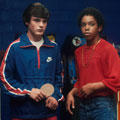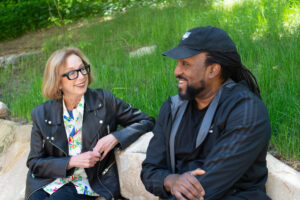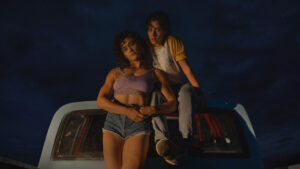Ping Pong Summer
Eric Hynes
A lot of filmmakers have passion projects. They’ll have scripts that remain on the docket for years, waiting for right time and the right financing to realize an ambitious or personal vision. But there’s never been a gestation quite like the one for Ping Pong Summer.
“I can safely say that not a week has gone by since at least 1992 where I haven’t thought of making a movie called Ping Pong Summer,” director Michael Tully said of his latest, a loving homage to 80s coming-of-age movies as well as a memory machine of Tully’s own childhood in Ocean City, Maryland.
Ping Pong Summer stars newcomers Marcello Conte and Myles Massey as teenaged seashore vacationers who spend their days in an arcade called the Fun Hub, passing the time playing ping-pong until two upper class bullies challenge young Rad (Conte) to a showdown.
Featuring supporting turns from 80s legend Lea Thompson and John Hannah as Rad’s parents, Amy Sedaris and Robert Longstreet as his weirdly over-tanned aunt and uncle, and Susan Sarandon as a Mr. Miyage-like mentor neighbor, the film straddles the vintage and the personal, broad comedy and unclassifiable weirdness.
How long have you been working on this script?
I remember when I was in high school, I was going to look at Flagler College in Florida with my parents, and remember driving through Virginia and seeing Radford College, and I was like, “Rad,” that’s a cool name for a kid. So that was 1992, and I was thinking about it then. And always the core characters, Teddy Fry, Lyle Lace, the bad guy, and more influenced by No Retreat, No Surrender, than The Karate Kid—a knockoff of The Karate Kid.
There was always the Rec Center, the showdown, the ping-pong, the hip-hop—those things were always there. At some point I had a friend who was an older actor who was attached, and Rad was in his 20s and he didn’t have a family, and ten years ago Sasquatch was in this movie drinking a 40. Every year I would rewrite it a few times based on what I was watching and influenced by.
How did it finally come to pass that you were able to make Ping Pong Summer?
In 2011, when I was at Sundance, I met George Rush, who was the sales agent for Septien, and he asked if there were any other movies that I wanted to make? And I was like, yeah there’s this ping-pong movie that’s my ball and chain, that I’ve been trying to make forever. And he was like, “wait, your dream project is a 1980s coming of age comedy with hip hop and ping-pong, and it’s not a sincere indie drama about heartbreak? I might be in on this.”
And that’s when it really became real. I had some flirtations with Hollywood when I was out of college, with a company that had a first look deal. But I would have been a co-writer, I wouldn’t have been able to direct. The movie was turning into an Adam Sandler comedy, all that hindsight humor, like “weren’t the 80s funny”? Then just within the past 3 years I decided to turn it into a tribute to both my adolescence and the movies I watched. What if you put those two together, and you inserted my adolescence into an 80s movie, what would happen?
I would imagine that in the 80s you were projecting yourself into those films as it was.
I would go to see The Karate Kid, and then my parents would pick me up and I’d get in the back seat and put the Fat Boys on my headphones. Those worlds were never connecting. I would watch Krush Groove or Wild Style, and then I’d watch No Retreat No Surrender. I wanted to see a movie that puts those things all together with ping-pong. I love ping-pong. I was never a master, never went to camp or anything, it was just a hobby. It still is. But what if we combined those things? No one’s ever done that before. You just hope and trust that the fact that you’re doing that will make it feel different.
Are you excited to finally introduce it to the world?
It’s very deeply, oddly, embarrassingly a personal movie. My parents are in the film. John Hannah is wearing my dad’s Maryland State Police uniform in the opening scene. So there’s some seriously personal stuff involved in this otherwise seemingly formulaic, standard, coming of age 80s movie. That’s why I haven’t made peace with it. Even with Septien, I was like, no movie’s perfect, it’s fine, but I made peace with it. This one it’s hard for me to watch. It’s just too me, somehow. I think I’m above it but I’m actually not, and I haven’t resolved it.
I don’t think you have to know you personally to know that it’s a personal film. It just comes through—the details, the specificity, the love for the locations. Which I think cuts against the notion that you’ve seen stories like this before.
That’s the hope, that by being specific it will be more universal. Maybe people didn’t listen to rap music in the 80s or maybe they didn’t grow up in the 80s, but you’re hoping that just by being honest with yourself and sincere, that it will connect. It’s all subjective, but that’s the dream scenario—that someone relates to it even if they don’t relate to it.
I grew up going to the shore in Wildwood, New Jersey, so it felt very familiar to me.
It’s all that stuff. Everyone’s got the buffet in town.
Was everything still as you remembered it in Ocean City, or did you have to go beyond that town to find things that resembled what you needed?
It’s a period piece, so we had to move cars out of the way and stuff. But the Paul Revere Smorgasbord was exactly the same. The only thing that was really the invention of the team was the Fun Hub itself. That was where the 80s movie took over my personal vacation. There were arcades, but there was never a Fun Hub. But all of the other stuff, the Put-Put, the mini golf, the boardwalk, those rides, when the kids are doing bumper cars—I have childhood pictures on the exact same cars—they haven’t changed.
The outfits that the workers wear are the exact same from the 70s. The day we were shooting the friend montage, the guy who runs the amusement park asked, “is it ok if our secretary”—this old lady—“sits on the bench as an extra in the background? She’s worked for us for 34 years.” So I call over Rachel, the costume assistant, and I was like, can you ’85 approve her? And she goes (looking her over), “She’s good.” [Laughs.]
By the end of the day I was just, roll the fucking camera, I can’t tell the difference. No one even had cell phones when we were shooting that night. I was like—we’re in ’85 right now. That’s the beauty of Ocean City, Maryland. Whereas certain other beach towns have tried to modernize, there’s no Starbucks there. They’re really committed to their traditional, old school nostalgic vibe.
I’d think the only thing that’s changed in a place like that is that the iron-on T-shirt slogans have changed.
That was the only thing. Like “Come at me bro” and “YOLO.” And in two years it will be a different word. But the style is still kind of endless, eternal beach culture.
Of course there’s going to be a showdown in the final sequence—that’s the genre—but at the same time I completely related to it, because at that age that’s exactly how your fantasies play out. There’s always the moment when you come from all the way back to win the contest, beat the bully, and impress the girl. I don’t know if the movies created the fantasy or if the fantasy gave rise to the movies.
It’s a chicken or egg thing. The other thing is that the dad [in the film] has a heart to heart with the kid before the showdown, when you’re supposed to be maximizing the drama, where it’s life or death. His dad tells him it’s ok, we love you, you’re going to be fine. Which is the opposite of what you’re supposed to do in a movie. And it was super important for me to do that.
People would read drafts and go, well then there are no stakes. And it’s like, well he’s 13, there aren’t stakes anyway. He’s going to be fine. He just wants to shut the prick up a little bit and sort of redeem himself. It’s not the end of the world, it’s not going to change his life. It’s a cool, awesome thing. It’s deflating drama rather than enhancing the drama, and that was a very conscious choice.
I think it feels right to that family, and to what it feels like to be 13. You may feel that everything’s against you, it’s probably not the case.
There’s that Chris Rock joke about the 80s, where black kids are like I’m broke, but fuck it, whatever—meanwhile a white kid misses an episode of St. Elsewhere and you have to lock the medicine cabinet. And it’s kind of like that. I remember when I was like, you’re sold out of Ice-T “Power” on cassette? I have to wait until Tuesday? People have grown up in dysfunctional, traumatic, terrible families, but I was very lucky.
Did you show 80s films to the young members of the cast?
Everyone had seen The Karate Kid. Lea Thompson’s in our movie, and everyone loves Back to the Future, even the kids that weren’t born yet. Those movies still have carry. But when it came to No Retreat No Surrender, I didn’t show anyone because the risk is that—it’s a little bit hokey, and if I show a non-actor kid this flamboyant character he’s going to be influenced by it.
I showed them some breakdancing clips, but we didn’t have a sitdown to say, here are ’80s movies. I wanted to inject real world naturalism into an ’80s movie. I wanted them to be kids and to trust that the outfits and the slang—like the moon looks “def” instead of the moon looks “swag”—that it would be really the same thing. The kids are the same it’s just the words have changed.
With the older cast, I would imagine it was the opposite, that of course they’d seen those 80s films.
Lea was in them.
That’s right. Did you have to steer her away from working into that groove?
I talked to them about a more understated approach, that we’re not trying to make light of the 80s and make fun of it. But just getting them to commit to a movie when the last movie I made was this weirdo with a beardo thing [was hard]. For years, the mentor figure was male, because it always is in movies—the Miyage character, the father figure.
I thought it would be funny to do Werner Herzog as the bleakest mentor in sports movie history. Just imagine Herzog talking about, “even if you win you lose,” and that was the funnest character to ever write. But then he got cast in Jack Reacher, and I talked to Harmony Korine who’s directed him, and it just seemed like a great idea in theory but in execution it would have turned the movie a little too loud or cartoonish. So I thought why don’t we make that character a female, because that never happens.
Then you think about what Oscar-winning awesome actress who has a very good sense of humor who also is a co-owner of a ping-pong club franchise, and you’re like, it’s a pretty short list. But you don’t want to do stunt casting. We had a conversation about how you’re here for who you are now, and I don’t want to make a movie that’s making fun of the ’80s. You’re living in 1985, not Lea Thompson who’s so aware that she’s in a 1985 movie. I just think that would be redundant. The ’80s were already weird and stupid enough. I wanted it to be from the inside out.
Did you confess your ’80s crush on Lea Thompson?
No, but I got lots of texts from friends who told me to tell her. Some of them are well-known directors. It was funny, when you’re in Ocean City, Maryland, this town you grew up in, and you’re talking to an actor who’s like, “I did this one movie, All the Right Moves, I don’t know if you’ve heard of it.” And you’re like, yeah, yeah, I saw that one. She wasn’t doing it in a cocky way. And you’re just kind of like—this is weird.
After 22 years, are you going to be able to let this go?
I hope. It’s crazy to think about a movie for this long. After 22 years, there’s got to be some sort of payoff. Even if we sold this movie for $10 million, with the amount of hours I’ve spent on it, the salary would still average out to like 8 cents an hour.




